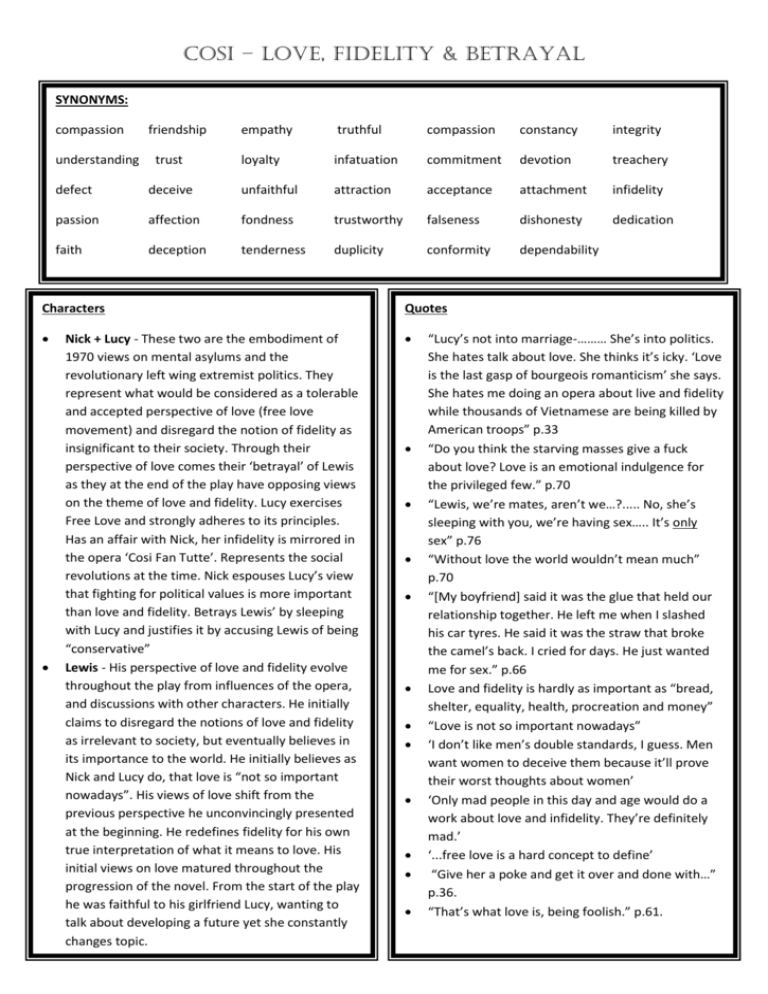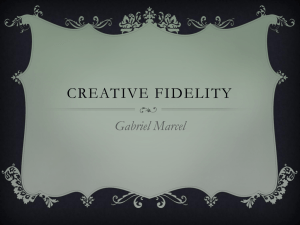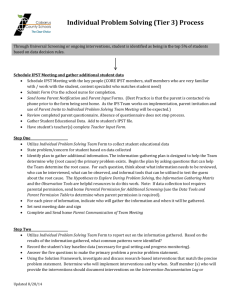COSI – LOVE, Fidelity & Betrayal SYNONYMS: compassion
advertisement

COSI – LOVE, Fidelity & Betrayal SYNONYMS: compassion understanding friendship trust empathy truthful compassion constancy integrity loyalty infatuation commitment devotion treachery defect deceive unfaithful attraction acceptance attachment infidelity passion affection fondness trustworthy falseness dishonesty dedication faith deception tenderness duplicity conformity dependability Characters Quotes Nick + Lucy - These two are the embodiment of 1970 views on mental asylums and the revolutionary left wing extremist politics. They represent what would be considered as a tolerable and accepted perspective of love (free love movement) and disregard the notion of fidelity as insignificant to their society. Through their perspective of love comes their ‘betrayal’ of Lewis as they at the end of the play have opposing views on the theme of love and fidelity. Lucy exercises Free Love and strongly adheres to its principles. Has an affair with Nick, her infidelity is mirrored in the opera ‘Cosi Fan Tutte’. Represents the social revolutions at the time. Nick espouses Lucy’s view that fighting for political values is more important than love and fidelity. Betrays Lewis’ by sleeping with Lucy and justifies it by accusing Lewis of being “conservative” Lewis - His perspective of love and fidelity evolve throughout the play from influences of the opera, and discussions with other characters. He initially claims to disregard the notions of love and fidelity as irrelevant to society, but eventually believes in its importance to the world. He initially believes as Nick and Lucy do, that love is “not so important nowadays”. His views of love shift from the previous perspective he unconvincingly presented at the beginning. He redefines fidelity for his own true interpretation of what it means to love. His initial views on love matured throughout the progression of the novel. From the start of the play he was faithful to his girlfriend Lucy, wanting to talk about developing a future yet she constantly changes topic. “Lucy’s not into marriage-……… She’s into politics. She hates talk about love. She thinks it’s icky. ‘Love is the last gasp of bourgeois romanticism’ she says. She hates me doing an opera about live and fidelity while thousands of Vietnamese are being killed by American troops” p.33 “Do you think the starving masses give a fuck about love? Love is an emotional indulgence for the privileged few.” p.70 “Lewis, we’re mates, aren’t we…?..... No, she’s sleeping with you, we’re having sex….. It’s only sex” p.76 “Without love the world wouldn’t mean much” p.70 “[My boyfriend] said it was the glue that held our relationship together. He left me when I slashed his car tyres. He said it was the straw that broke the camel’s back. I cried for days. He just wanted me for sex.” p.66 Love and fidelity is hardly as important as “bread, shelter, equality, health, procreation and money” “Love is not so important nowadays” ‘I don’t like men’s double standards, I guess. Men want women to deceive them because it’ll prove their worst thoughts about women’ ‘Only mad people in this day and age would do a work about love and infidelity. They’re definitely mad.’ ‘...free love is a hard concept to define’ “Give her a poke and get it over and done with…” p.36. “That’s what love is, being foolish.” p.61. Characters Quotes Henry speaks about his mother as being completely faithful and devoted to his father. Henry is also betrayed by his wife during the time he loses the trial, she leaves him and he is deeply affected by the loss of support. Julie possesses a realistic perception of the sexist discrimination between men and woman when it comes to love and fidelity. Much like Lucy, she sees the double standards that exist between men and women and its reflection within the morals expressed by the opera. She values fidelity as a need in her life because she needs somebody to support her. Although falling for Lewis, she remains dedicated to her true love being her girlfriend, as she has stuck by her though the thin. Ruth’s experiences which lead to her mental deterioration and admission into the asylum gives insight into the difference between love and lust and the misguided views of love and sex in 1970s society. Roy is baffled by the concept of love as he has never been loved and always been abandoned. He uses the performance Cosi Fan Tutte to feel comforted, to feel wanted for once in his life and also to feel the emotion of love and to be loved. He believes hate is a “more pure emotion” than love. This may be due to the fact that he never experienced love of any kind due to being an orphan Cherry is in love with Lewis and could stay faithful to him but these feelings are only one sided. Lewis does not share these feelings and her love is only driven by physical attraction. She can get violent or aggressive if she feels her emotional pursuit of Lewis is threatened, mostly by Julie. Doug believes in free love, but has restricted opportunities to practice it in the asylum. Dorabella, Fiordiligi, Ferrando, Guglielmo – the ‘play within a play’, whose relationships are bound by love, fidelity and betrayal. The initial quest by Ferrando & Guglielmo to trap the women by proving their infidelity; by showing ‘women are like that’ or ‘they all do that’. “Love is what you feel when you don’t have enough emotion left to hate.” p. 61 “Love is hallucinating without drugs.”p.61 ‘I believe in free love but it’s hard to practise it in here’ p.18 ‘Women like to pretend they don’t play around but they’re just more secretive about it’ p.18 ‘This Cosi condones the corruption of innocence. Women are told to be tramps. Free love. Women are not to be trusted’ p.48 ‘Don Alfonso is proved right. Women are never true.’ p. 9 ‘Lucy’s not into marriage…We sometimes talk about commitment…But it never gets far’ p. 33 “It’s about important things – like love and fidelity.” p.70 “Woman’s constancy is like the Arabian Phoenix” p.34 “Whether women can remain true is a ttttragedy” p.49 “Women shouldn’t come between mates…It’s only sex.” p.77 “Some people can’t imagine life without love, well I can’t imagine life without junk.” p.37 “You’ve always mistaken lust for love” p.70 “You share her?” p.18 Nowra’s challenge, contention, intention That love and fidelity are important in society and that it is required to keep people together. That love is not a priority in people’s lives; “an emotional indulgence for the privileged few” That 18th century notions of fidelity still exist in modern times and are ultimately part of human nature. That double standards of love and fidelity exist between men and women. That lust and love are two different indulgences and do not necessarily intertwine. That the opera and the play both demonstrate that men, like women are also unfaithful. That there are double standards in play in how men and women are treated. That love is a swerving and uncontrollable emotion. Also the men and women double standards which exist. That love is not a desirable artistic or philosophical state, that it is not so much “divine madness” as it is simply madness, balancing the play’s overwhelming support for a non-judgmental view of madness. That the question of where loyalties are owed and under what circumstances they are obligated to be met. In a socially progressive and tumultuous time of the 1970’s, the devastation and implication of the Vietnam war were rife in society and the notion of love and fidelity is hardly as important as “bread, shelter, equality, health procreation and money” That love is important no matter what society’s values suggest, it is the need for support that people need love. That by the use of the opera these characters can explore their views and values on love and fidelity; this allows Lewis to be able to express himself freely without following Nick and Lucy. That society encompasses double standards. That those who have love have a responsibility to appreciate it. That those who haven’t experienced love are in search for someone to love them. That love is always significant. That love/fidelity aren’t ideals/feelings/things that can go out of custom That every Tom, Dick, and Harry needs and has a right to be loved. That life without love can be lonely, tough and unsatisfying. That our attitudes to love and relationships are deeply shaped by our family & relationships. That love and betrayal may be done by both sexes. That fidelity a test of true human emotion and loyalty. That love is always important. That everyone has a need to be loved and attached to another. That life without love is lonely, depressing, meaningless and a life not to live at all. That love and betrayal can be no different to hatred. That fidelity suppresses free love. That love is essential. That everyone deserves to be loved by those closest to them. That life without love can be lonely, depressing and difficult to endure. That our attitudes to love and relationships are a reflection of those around us. That love is a quality to be cherished. That there is a qualitative difference between lust and love. That men and women are both unfaithful in relationships, not just women like Cosi, ‘Cosi Fan Tutte’ and society suggest. Through Roy, Nowra shows that living without being loved is tragic. That through Lewis, Nowra is challenging men that expect women to be faithful , ‘even if they’re not true and faithful themselves’. He is questioning societies Morals and values. That Fidelity is merely an idea. That the mental patients are more honest than the rest of society. That the concept of fidelity has been lost due to the desperation of the youth to break free from the oppression of the 1950’s.






